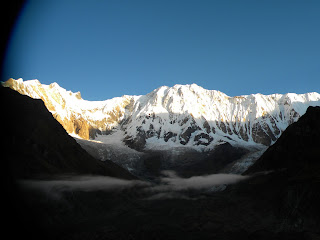What sane person could live in this world and not be crazy?
-Ursula K. LeGuin
Lama groupies are like Jolie-Pitt groupies but with cheaper cameras.
I join the small crowd standing outside his house. We’re hoping for a glimpse as he enters, cameras poised, the spiritual-political paparazzi drooling for a snap to plaster on the cover of Dharma Stars Weekly. My account grows more pathetic, I admit to being excited, to having a heart rate mid horse race, to bouncing on the balls of my feet like a terrier would for dangling meat. The incisors are out, I’m laughing at our collective foolishness, at our synchronous intake of breath as his entourage approaches
There’s a white SUV and there he is, in the front passenger seat of the next vehicle, one of the planet’s few heroes outside the cineplex. His Holiness the 14th Dalai Lama is smiling, he never stops, he raises both hands to give an air of mock surprise that a parent might reserve for Mickey Mouse. We’re not the rodent, we’re the children the expression is intended to incite joy in, and it works. We giggle as the Dalai Lama enters his compound trailed by three more SUVs. A forty-five minute wait for a 4.5 second sighting and its high-fives all around, we did it, we almost made eye contact with Buddhism’s biggest celebrity.
It comes at a time when monk self-immolation is on the rise in Tibet, when His Holiness is making regular appearances on BBC, when the Chinese government continues to label him a terrorist for bringing unwanted attention to the communist-controlled autonomous zone, and when amateur footage continues leaking over the Indian border from Tibet documenting Chinese soldiers kicking cuffed monks in the ribs while striking their skulls with billy clubs and monks sitting themselves ablaze in protest as crowds surround to watch the bodies burn alive in silence. And still the Dalai Lama smiles. He’s either enlightened or deranged, although perhaps the two are duplicitous, are one and the same. Those that sit Indian-style with feet resting on the opposite knee while chanting for hours on end live in asylums in North America and monasteries in Dharamsala and life is more about geography than sanity.
The maroon-robed, they’re always beaming, every time I converse with monks, usually at a request to practice their English, big grins plaster their faces and yes, I’m fat, balding and old, the trifecta of inaffection, a silly sight to behold for sure, yet it always seems as though they’re laughing with me, not at me. An infectious joy, there’s always a stupid grin on my ugly mug too. Stupid, because I’m unsure as to what I’m smiling about and I need a reason for there will be no smiling without just cause, my fellow Americans. I know what you’ll call me and where you’ll confine me if I’m unable to proffer sufficient excuse and so, for the moment, this monastery-crammed geography appeals to my freedom of movement. Plus, if I ordain I’ll never have to wear pants again. It may not be enlightenment but the breeze down under, it’s close enough.
Keep drifting.









